Do You Need a CDL to Drive a Garbage Truck?
CDL is typically required for garbage trucks. Learn about legal requirements, CDL classes, and state regulations. Check your eligibility now.
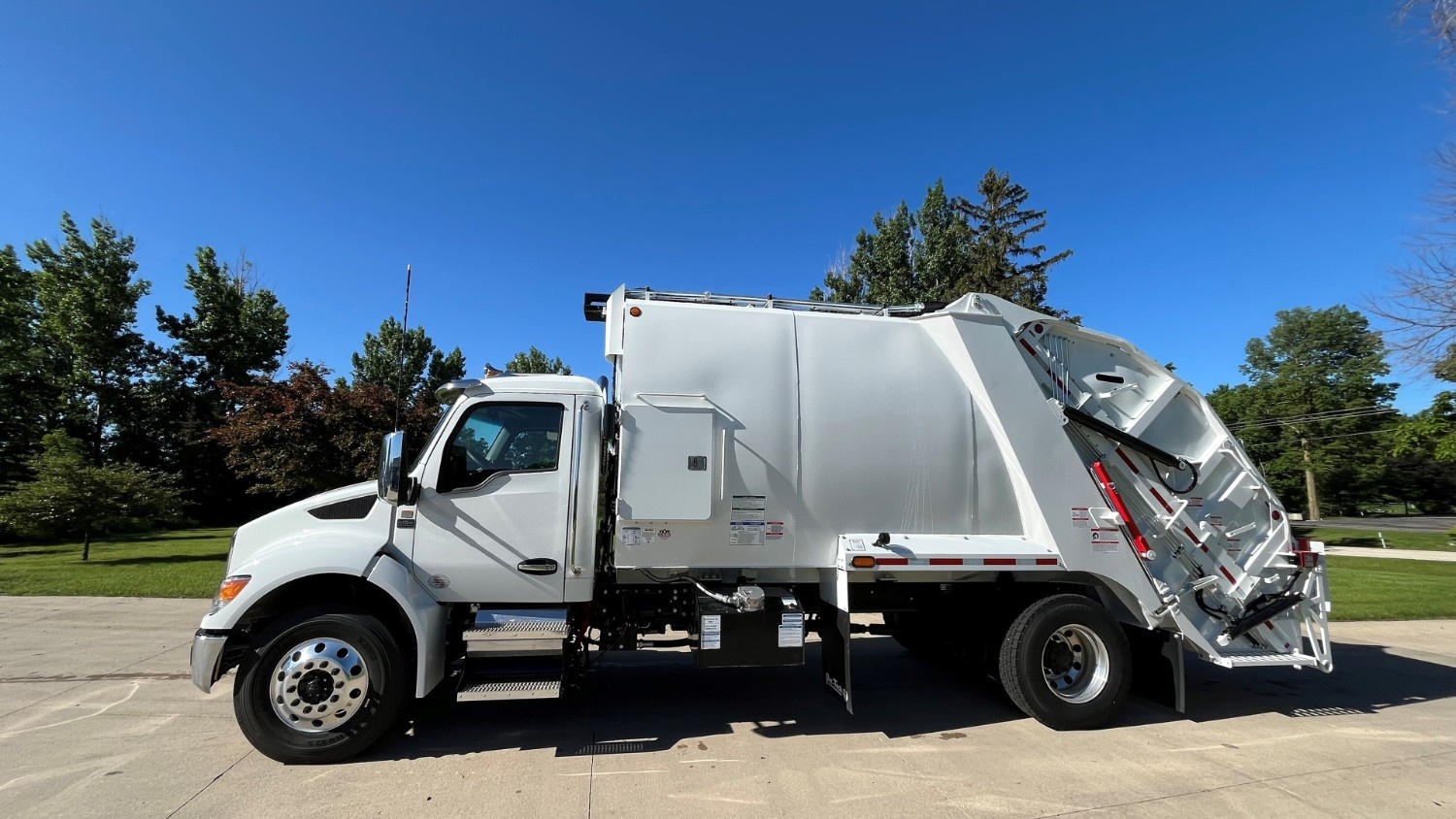
CDL is typically required for garbage trucks. Learn about legal requirements, CDL classes, and state regulations. Check your eligibility now.

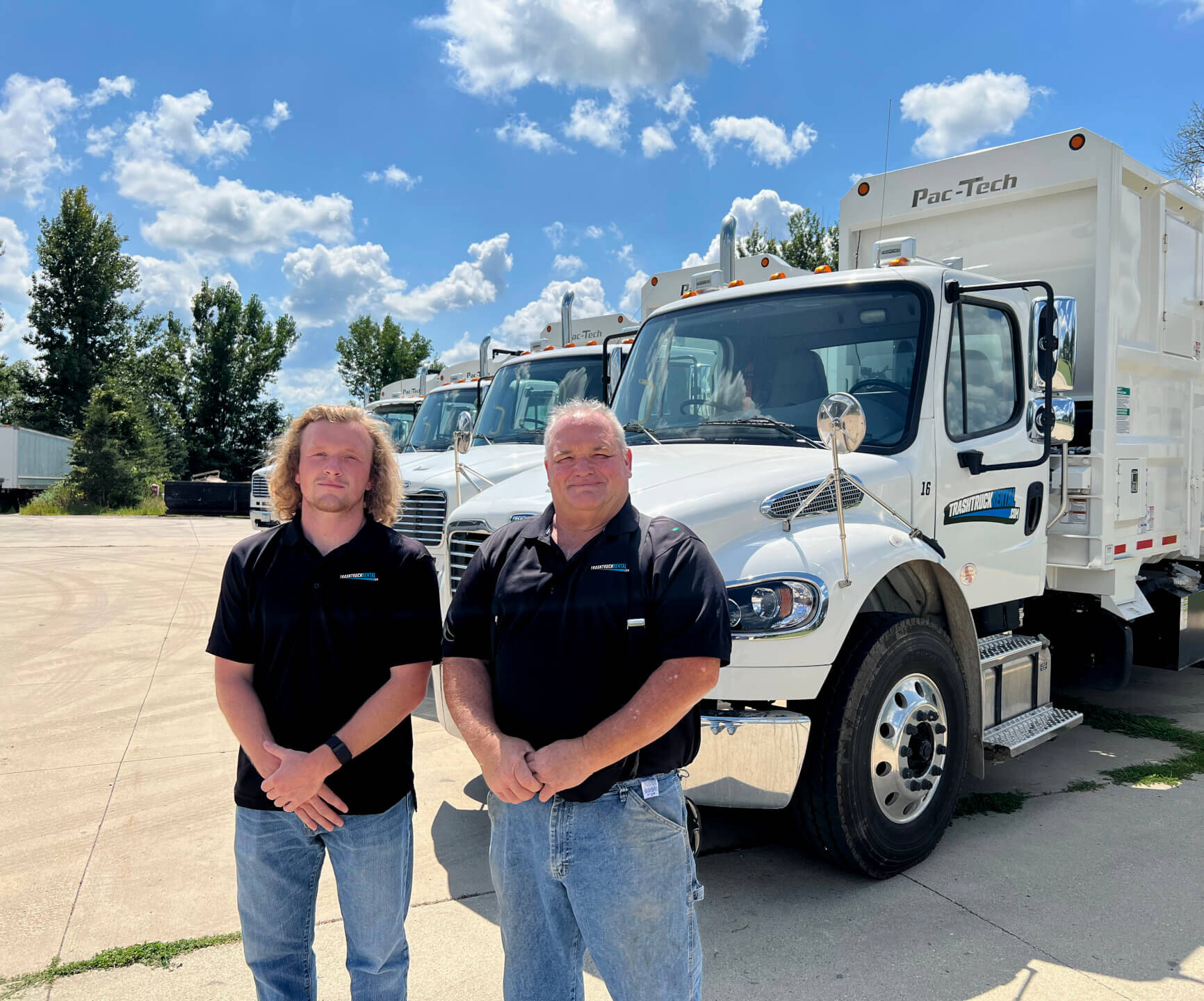
If you're thinking about driving a garbage truck, the first thing to figure out is whether a Commercial Driver's License (CDL) is required. In most cases, yes- you'll need a CDL to operate standard garbage trucks, especially those with a Gross Vehicle Weight Rating (GVWR) above 26,000 pounds. However, not all routes or trucks fall under the same rules. What type of garbage truck you're driving, and where can change the answer.
We know license requirements can feel confusing, especially when you're trying to get started or move into a new role. Whether you're a driver looking to grow your career or a fleet manager hiring for municipal routes, it's important to understand what's legally required. This article lays it out clearly: truck types, license classes, common exemptions, and what employers typically expect.
If you're planning to drive or hire for a garbage truck operation, it's not just about vehicle size. Federal CDL laws set the baseline, but each state adds its own conditions. Here's how the two layers work together and where the exceptions show up.
Under FMCSA (Federal Motor Carrier Safety Administration) guidelines, you need a CDL if the Gross Vehicle Weight Rating (GVWR) is 26,001 pounds or more. This covers most full-size garbage trucks, including rear-loaders and roll-offs.
For these setups:
Air brakes and hydraulic lift systems can also trigger the need for extra training or endorsements, even if the truck barely crosses the weight limit.
For fleet managers and operations leads, this means you'll need to check both specs and attachments before assigning drivers.
Federal CDL law applies across the U.S., but how it's enforced or supplemented changes from state to state.
Here are a few key areas where states add conditions:

Before assigning a route across state lines, double-check your driver's license, endorsements, and medical clearance, especially if your trucks cross over from, say, Iowa to Wisconsin or Minnesota to the Dakotas.
Pro-tip for operations heads: A driver who qualifies for a CDL route within your state may not meet the requirements for an interstate haul. Don't assume reciprocity.
There are a few exceptions where a CDL isn't mandatory. These are limited, but they apply to some municipal setups and private operations.
You might not need a CDL if:
Even when CDL isn't required, many employers still prefer CDL-certified drivers to reduce risk and ensure readiness for route changes.
For compliance officers and COOs, ignoring these details can result in failed audits, denied insurance claims, or operational downtime.
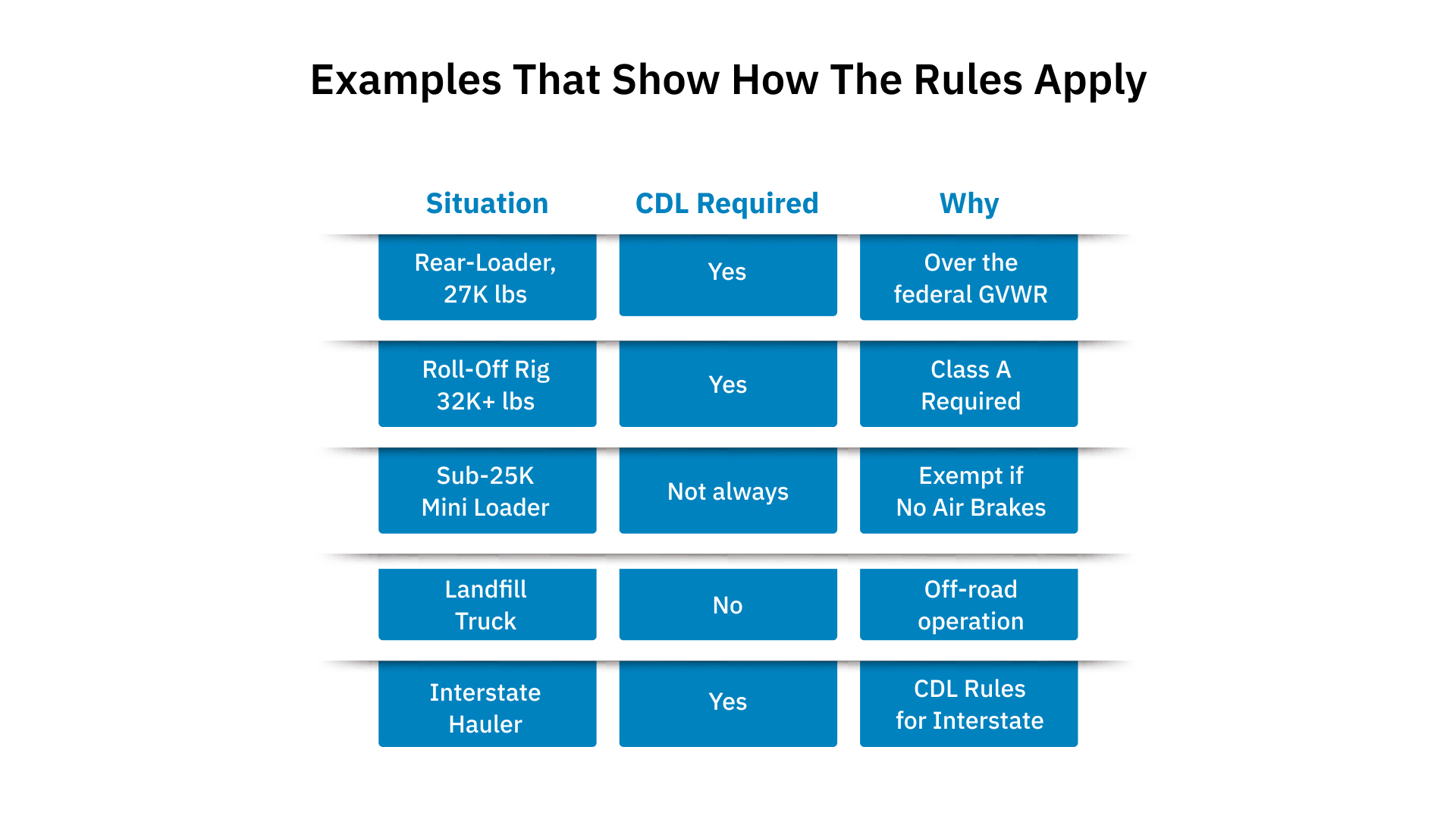
Here's a breakdown of typical scenarios so you can see exactly when a CDL is required and when it's not.
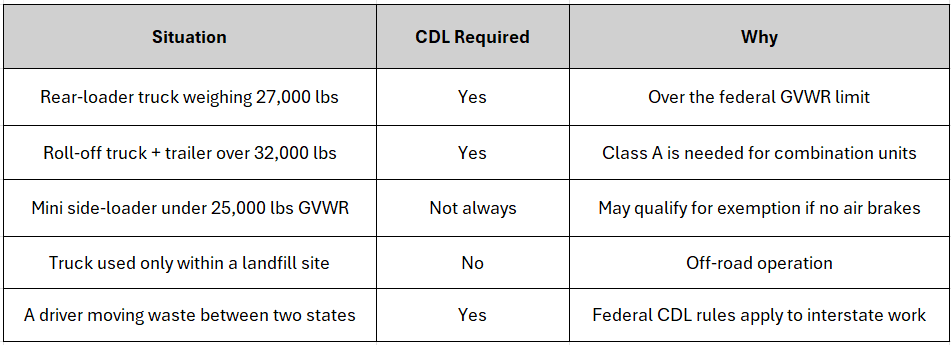
Each case comes down to GVWR, trailer size, and whether the vehicle travels on public roads. It's not just about the truck; it's about the job you expect it to do.
Once you understand whether a CDL is legally required, the next step is knowing which CDL class fits the type of garbage truck your team operates.
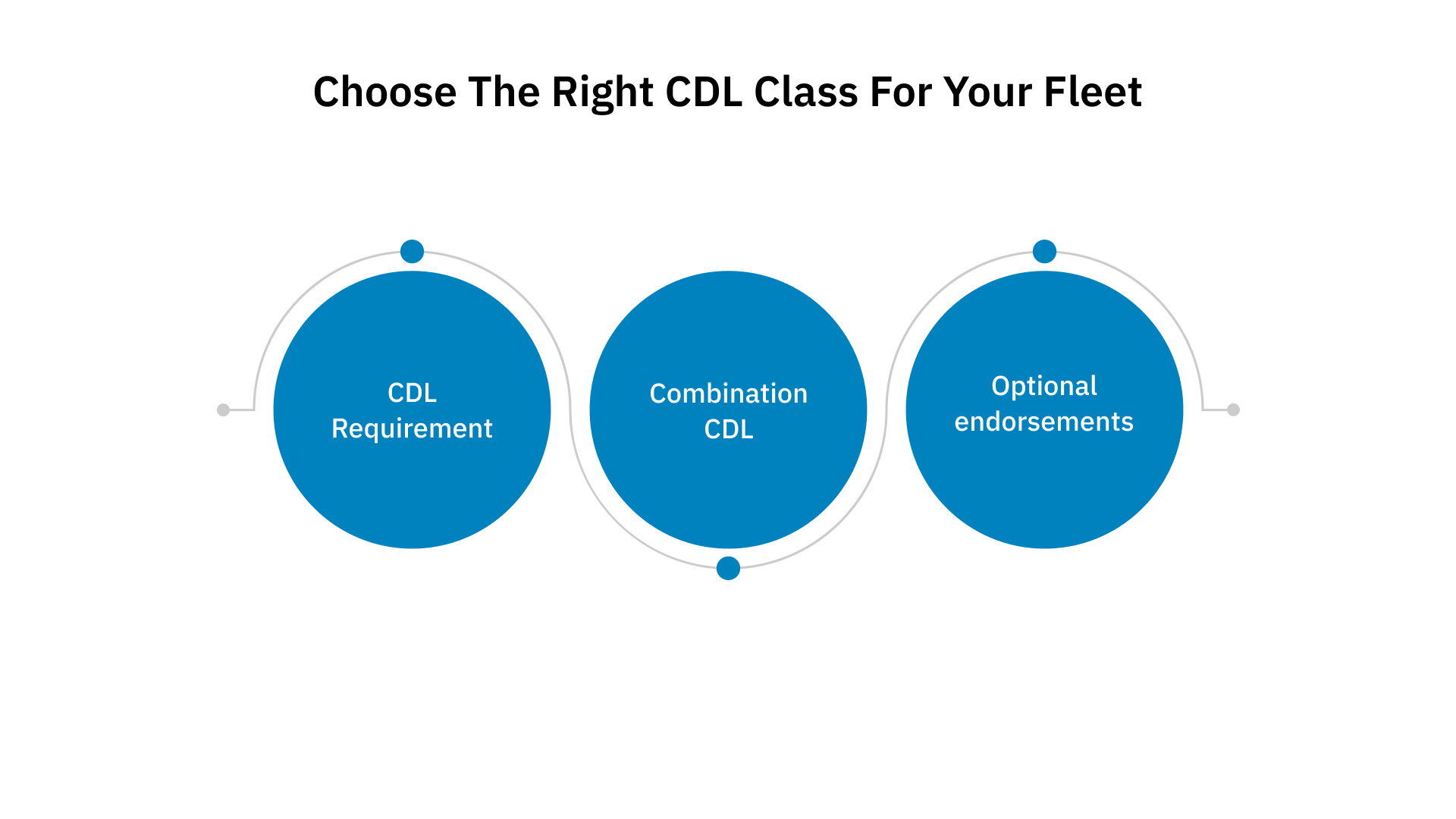
Not every garbage truck setup needs the same type of CDL. The class you or your driver needs depends on how the truck is configured, what it's hauling, and how much it weighs when loaded. If you're responsible for staffing routes or managing licensing for your municipal or commercial fleet, choosing the right CDL category avoids compliance issues and unnecessary training costs.
Here's a clear breakdown of which CDL applies to each kind of setup so that you can plan your fleet requirements confidently.
For rear-loaders, automated side-loaders, and roll-offs that operate as a single vehicle, a Class B CDL usually covers it.
Here's how to know Class B is the right choice:
If you're hiring for local or municipal routes, this is the class you'll need most. Many commercial sanitation companies build their entire workforce around Class B drivers for this reason.
Tip for operations managers: Hiring Class B CDL holders reduces the time it takes to onboard new drivers for standard collection routes.
Some waste collection setups require a Class A CDL, especially when trucks pull heavy trailers or operate near transfer stations where loads shift between vehicles. Drivers with a Class A CDL can legally operate Class B and C vehicles, but not the other way around.
Scenarios that require Class A:
Class A gives you flexibility, but training and licensing take more time and cost more upfront. Only choose it when your operations truly demand it.
Endorsements are add-ons to a CDL. Not every garbage truck operation needs them, but if you're expanding your service profile or taking on government contracts, these might apply.
Here's a quick breakdown of which endorsements matter, when, and why they may come into play:
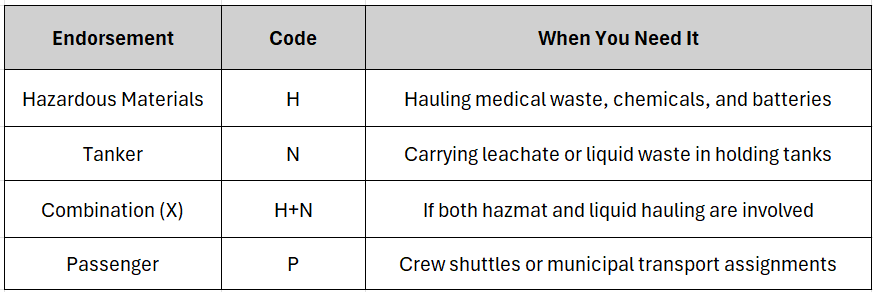
For procurement heads or fleet supervisors, checking whether an endorsement is required helps avoid penalties during random inspections.
For instance, if your driver handles dumpster cleaning with water tanks on board, even unintentionally crossing into 'tanker' territory without an "N" endorsement can lead to a fine or invalid coverage.
After selecting the right CDL class, it’s important to consider who’s eligible to drive, especially when it comes to age limits, experience, and hiring standards.
Hiring a garbage truck driver isn't just about passing a CDL test. Employers, especially city departments and private haulers- look at age, experience, and driving record to gauge reliability. These benchmarks help reduce turnover and insurance risk.

The legal age to hold a CDL is tied to how far and where you plan to operate:
Note for fleet managers: While 18-year-olds may qualify legally, many municipalities prefer hiring drivers 21+ due to insurance and route liability concerns.
Most employers don't just want a valid CDL, they're hiring for dependability and a track record.
Here's what they usually look for:
If you're managing a fleet, hiring someone with actual route or sanitation experience can cut training time in half.
A valid CDL isn't helpful if it comes with flags on the MVR (Motor Vehicle Record). Employers check for:

Note: Many insurance providers give lower premiums for companies with clean-driver policies in place.
Once drivers meet the required age and experience criteria, the next step is completing the CDL testing process to qualify for the job.
Getting a CDL isn't just about knowing how to steer a heavy truck. Whether you're hiring or applying, the process involves multiple steps that test a candidate's knowledge, readiness, and legal compliance. This ensures drivers are prepared not just to operate but to do so safely and within DOT rules.
Before anyone touches the wheel, they'll need to pass written exams based on truck class and any endorsements.

Most states use FMCSA-based questions, so the prep stays consistent. But double-check with your state DMV for updates. Some include questions on state-specific hauling rules.
This part is often underestimated, but it's where many first-time applicants get disqualified. The road test simulates what drivers will do daily, from checking equipment to navigating tight turns.
Core Sections Include:
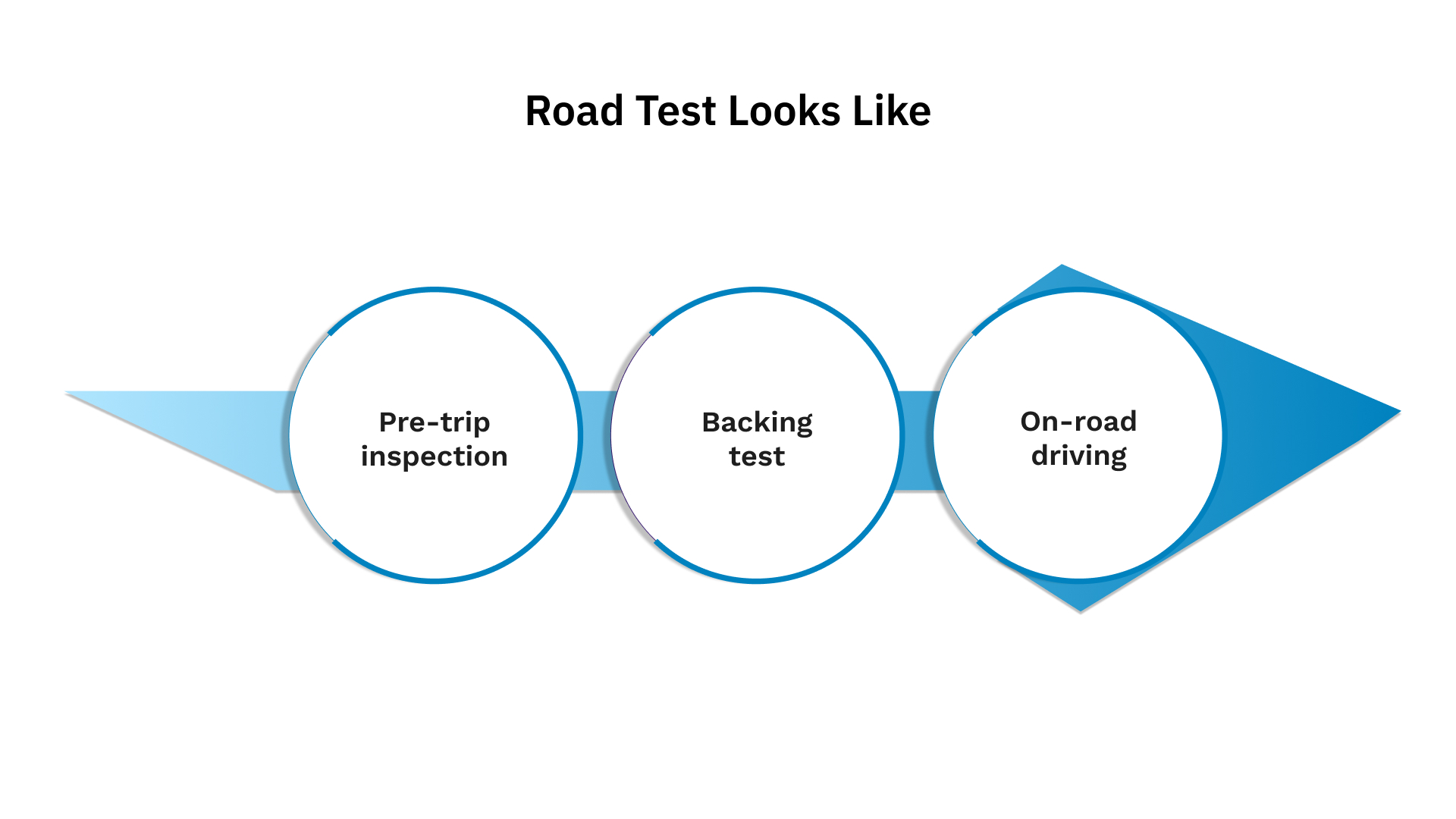
If you're hiring, look for drivers who have passed this on the first try—it often reflects real-time awareness and practical training.
Once a CDL is issued, compliance doesn't stop. DOT and employers track how drivers manage their hours and rest breaks.

Operations heads and fleet managers: Not maintaining this data properly can lead to FMCSA penalties, especially if your team runs multi-state contracts.
While licensing is a critical step, having access to CDL-compliant trucks that meet legal and operational standards is just as important.
Whether you're waiting for new hires to complete CDL training or you're managing a contract that needs immediate coverage, Trash truck rental can help bridge the gap. Our fleet includes Class B-ready garbage trucks that meet CDL requirements, are fully inspected, insured, and available on flexible leases starting at 28 days.
We work with municipal departments, private waste companies, and commercial haulers across Minnesota, Wisconsin, and Iowa. All trucks come clean, DOT-compliant, and equipped with the paperwork your drivers and compliance team need.
Looking for CDL-ready trucks? Contact Trash truck rental and explore available units, and check availability in your area.
If you're planning to operate a garbage truck, whether for municipal contracts, private waste hauling, or commercial cleanups, you'll likely need a CDL. Most drivers require a Class B license, but depending on your truck's configuration or route demands, Class A or specific endorsements may apply. Compliance with federal weight rules, air brake standards, and state-specific regulations is non-negotiable.
Getting certified isn't just about passing a test. Employers also expect physical fitness, a clean MVR, and solid driving experience. If you're a decision-maker managing a fleet or expanding your team, make sure licensing is part of your onboarding process, not an afterthought.
Need help building or managing your CDL-compliant fleet? Request a quote from Trash Truck Rental to explore short-term and long-term options that match your route, crew, and compliance needs.
No, in most cases you’ll need a CDL—especially if the vehicle’s gross vehicle weight rating (GVWR) exceeds 26,001 lbs. However, some smaller trucks used on private property or in gated facilities may be exempt depending on local laws.
Training programs usually take 4 to 8 weeks. This includes classroom instruction, hands-on driving, and preparation for written and skills tests. The exact duration depends on your state and the type of CDL (Class A or B) you're pursuing.
Nationwide, the average first-time pass rate for the written test is around 50–60%. Road test pass rates are higher, often 70% or more, especially among drivers who receive formal training from accredited programs.
The license requirements are typically the same. However, public-sector roles (municipalities) may have additional hiring standards like background checks, longer tenure expectations, or union regulations.
Some companies hire entry-level CDL holders, but many prefer at least 6 months to 1 year of commercial driving experience. Municipal contracts often list prior waste collection experience as a preferred qualification.
Penalties include hefty fines, possible jail time, immediate disqualification from driving commercial vehicles, and potential liability for the employer. Employers may also face DOT violations and insurance repercussions.
Yes. CDL-A drivers, who can operate larger or more complex setups, generally earn 10–20% more on average, especially in roles involving transfer trailers or long-haul waste transport.
Ready to Upgrade Your Process Operations?